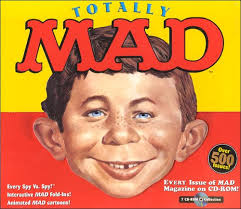中文词源
mad 发疯的
来自Proto-Germanic*maid,变坏,恶化,来自PIE*mei,改变,词源同mutual,miss.后引申词义心理失常的,发疯的。
英语词源
- mad
-
mad: [13] The underlying etymological meaning of mad is ‘changed’. It goes back ultimately to Indo-European *moitó-, a past participial form based on *moi-, *mei-, ‘change’ (source also of Latin mūtāre ‘change’, from which English gets mutate). Prehistoric Germanic inherited it, adding the collective prefix *ga- to form *gamaithaz, which passed into Old English as gemād ‘insane’. From this was derived the verb gemǣdan ‘madden’, whose past participle gemǣded eventually became a new adjective gemǣdd. By the Middle English period this had become amadd, and the reduced prefix aeventually disappeared, leaving mad.
=> mutate - mad (adj.)
- late 13c., from Old English gemædde (plural) "out of one's mind" (usually implying also violent excitement), also "foolish, extremely stupid," earlier gemæded "rendered insane," past participle of a lost verb *gemædan "to make insane or foolish," from Proto-Germanic *ga-maid-jan, demonstrative form of *ga-maid-az "changed (for the worse), abnormal" (cognates: Old Saxon gimed "foolish," Old High German gimeit "foolish, vain, boastful," Gothic gamaiþs "crippled, wounded," Old Norse meiða "to hurt, maim"), from intensive prefix *ga- + PIE *moito-, past participle of root *mei- (1) "to change" (cognates: Latin mutare "to change," mutuus "done in exchange," migrare "to change one's place of residence;" see mutable).
Emerged in Middle English to replace the more usual Old English word, wod (see wood (adj.)). Sense of "beside oneself with excitement or enthusiasm" is from early 14c. Meaning "beside oneself with anger" is attested from early 14c., but deplored by Rev. John Witherspoon (1781) as an Americanism. It now competes in American English with angry for this sense. Of animals, "affected with rabies," from late 13c. Phrase mad as a March hare is attested from 1520s, via notion of breeding season; mad as a hatter is from 1829 as "demented," 1837 as "enraged," according to a modern theory supposedly from erratic behavior caused by prolonged exposure to poison mercuric nitrate, used in making felt hats. For mad as a wet hen see hen. Mad money is attested from 1922; mad scientist is from 1891. - mad (adv.)
- late 14c., from mad (adj.).
权威例句
- 1. " Queer " is the word often used euphemistically for " mad ".
- “ Queer ” 这个词常用作 “ mad ” 的委婉语.
- 2. There are certain things he does that drive me mad.
- 他的某些举动让我很生气。
- 3. She's not as mad about sport as I am.
- 她不像我对体育那么痴迷。
- 4. You are mad, Isabel. You should be locked up.
- 你疯了,伊莎贝尔。应该把你关起来才是。
- 5. The family's hopping mad that she left them nothing.
- 这家人因为她什么也没有给他们留下而气得跳脚。

